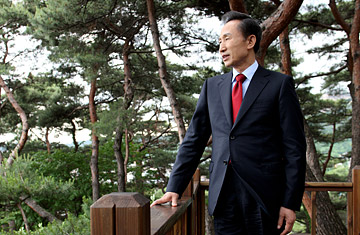
Bend in the Wind
As President, Lee has had to modulate his hard-charging style
(2 of 2)
In his interview with TIME, Lee says he "fully understands" the protesters' point of view. "This is a matter that concerns their health and safety of their young children," Lee says, adding that the modified beef ban "will allay the fears and concerns of those who are strictly worried about food-safety issues." Speaking through an interpreter, Lee also says he recognizes that the surprisingly large and vociferous demonstrations were about more than bad meat. South Korea has an entrenched culture of protest. Under authoritarian rule, students took great risks in staging pro-democracy demonstrations; those who took those risks ultimately became heroes when, in 1987, a crescendo of street riots forced dictator Chun Doo Hwan to allow direct presidential elections. "There is a tradition and a history here in Korea where public demonstrations were the beginning of true and meaningful changes," Lee says.
Lee may have inadvertently made demonstrations more likely by raising public expectations a little too high. When he took office as the country's "CEO President," he promised to lift South Korea's economic growth to 7% (from 5% in 2007) and to double the country's GDP per capita in 10 years to $40,000 through a program of deregulation, freer trade, and lower taxes aimed at spurring foreign and domestic investment. Lee says he wants "to make Korea one of the advanced, first-rate nations that will be extremely competitive globally."
But to the average Korean, that goal seems increasingly out of reach. The country's economy is slowing. Inflation is running at an annual rate of nearly 5% — the highest in seven years — due to soaring food and fuel costs. This is not the picture of an economically vibrant Korea Lee painted for voters — and the President acknowledges his goals "will have to be adjusted" to take into account the domestic impact of a global economic slowdown and possible recession in the U.S. "The international economic scene has not been very favorable," he says, "so we cannot expect results immediately. I think right now, the Korean people who elected me might be going through a phase in which they are rather disappointed that they are not seeing change as fast as they want to see it."
Perhaps it's a passing phase. Perhaps it's something worse. Lee, says Hahm, the Korea University professor, is facing "a serious crisis" that could hobble his administration for the remainder of his five-year term. To avoid that fate, Lee will have to try harder to sell his policies, instead of simply implementing them and expecting the public to go along. "Lee is not sophisticated and does not understand the political implications of his attitude and behavior," says Lee Jung Bock, a political-science professor at Seoul National University.
It's of vital importance that Lee turn things around, and not just for South Korea. As a longtime (although sometimes disagreeable) ally of the U.S. and an increasingly important trading partner with China, South Korea plays a key role in maintaining the balance of power in Northeast Asia. Lee, who recently returned from a trip to China that included a tour of earthquake-devastated Sichuan province, says he doesn't see a conflict in cultivating ties with both world powers. "China is our No. 1 trading partner as well as No. 1 destination for Korean investment," he says. "Our relationship has grown very close over the years and we cannot realistically ignore this." At the same time, Lee says he intends to continue to boost ties with Washington "because this will ensure not only the peaceful stability of Northeast Asia but also help to deter war here on the Korean peninsula."
The war he refers to is, of course, the possibility of conflict with North Korea. To help prod Pyongyang into giving up its nuclear weapons, Lee has rolled back South Korea's policy of providing unconditional economic assistance to the North. Instead, he has linked economic cooperation with progress in nuclear disarmament. The move enraged Pyongyang, but Lee says he is undeterred, and that South Korea, a member of the six-party talks on North Korean nuclear disarmament, will continue to work with China and the U.S. on a solution. Regarding reports of looming famine in the North, Lee says "I don't think anybody has a 100% accurate assessment" of the seriousness of the crisis. But he says that if Pyongyang asks for humanitarian assistance, "we are, and we always have been, prepared to provide it."
Of more immediate concern is his own crisis at home. But Lee's track record suggests that he will weather the storm. He chooses to see the political upheaval around him as a positive — as a "dynamic aspect of Korea" and "the defining character that really differentiates Koreans and Korea from other countries and people," he says. "This can be harnessed into an engine of growth." Or it can make a President's term in office very uncomfortable.
